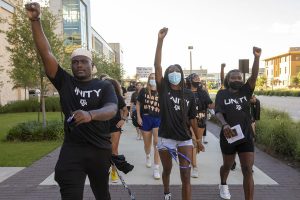(ThyBlackMan.com) The 2020 college football season has a lot of uncertainty. The coronavirus pandemic has caused a lot of questions even as states begin to slowly reopen. One of the most popular sports in America, college football, faces questions about player safety, proper quarantine procedures, scheduling games, and how college football fans will be able to attend games given the large capacities of many college football stadiums. If college football returns, the team dynamics on many college football teams might be very different given how vocal many black college football players of the past and present have been about racial issues on college campuses.
One of the consistently good programs in the Big Ten Conference are the Iowa Hawkeyes’ program. Iowa can usually be counted on to win around 8 or 9 games every season and they are rarely a mediocre team. They are led by the longest tenured head football coach in the nation, Kirk Ferentz, who is entering his 22nd year as head football coach at the University of Iowa. Ferentz and Iowa’s football program found themselves under the microscope as many black Iowa football players opened up about feeling mistreated, uncomfortable within the program, and decried the unethical behavior of Iowa strength coach Chris Doyle. Ferentz, who is white, has recently admitted to having a “blind spot” related to issues his black players were having within the program and has had multiple meetings and conferences with his players about racial issues.
program, and decried the unethical behavior of Iowa strength coach Chris Doyle. Ferentz, who is white, has recently admitted to having a “blind spot” related to issues his black players were having within the program and has had multiple meetings and conferences with his players about racial issues.
The Texas Longhorns have one of the most well-known collegiate athletic brands in America. Like virtually every PWI, there is a history of racism within the University of Texas and several athletes at Texas are challenging some of the traditions within the university. Via statements on social media, they are requesting the removal of “The Eyes of Texas” as the school song and changes to names of campus buildings in an effort to make the Austin campus more inclusive to the black community. The challenging of the song, “The Eyes of Texas” is really significant because for most colleges and universities, their schools’ fight song is as important as the school colors. The history behind that particular song is that it was a “satirical song once performed at minstrel shows, which are comedic variety shows featuring white performers in blackface” according to UT Professor Dr. Edmond Gordan.
The renewed discussions around race have extended to one of the elite programs in college football, Clemson. Their head coach, Dabo Swinney, has proven himself to be a great football coach who falls very short in understanding important social issues. A lot of former Clemson black players have spoken out against the name of the honors college at Clemson which is named for John C. Calhoun, a South Carolina politician who served as vice president of the United States from 1825 to 1832 and was an outspoken advocate of slavery, saying it was “a positive good.” Current NFL players who went to Clemson including Deshaun Watson and DeAndre Hopkins advocated for the change and the school renamed the honors college, the Clemson University Honors College.
Like many black people in America feel empowered to openly discuss white privilege and white surpremacy with other white people, it seems that black college athletes are feeling empowered to speak out against racism on college campuses and college football programs. Athletes will use this new forum that we find ourselves in due to the social unrest of police brutality to point out things they feel need to be spoken about. Institutional and structural racism will not be undone by college athletes but they can make impacts in ways they see fit and should be given credit for doing so.
Staff Writer; Mark Hines




















Leave a Reply